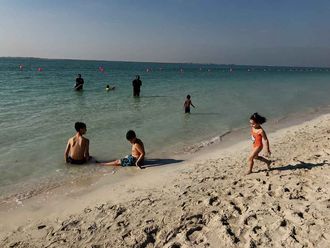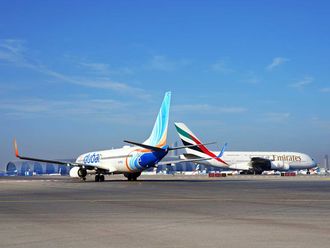The UAE Date Palm Research and Development Programme has successfully introduced 10 new varieties of date palm in the country and plans to introduce 18 more this year.
The programme has also achieved the target of producing 40,000 plants, and has set a new goal of producing 100,000 date palms this year, according to an achievement report of the programme, which operates from UAE University.
The programme, a UAE University project in cooperation with the United Nations Development Programme, has built two more nurseries to increase capacity to meet the new target.
The project of introducing new varieties was launched on November 13, 2000 and continued till March 19, 2001. A total of 12 date varieties and one male date palm were included in the in vitro introduction.
"Ten out of the 12 selected varieties were successfully introduced and their multiple shoot formation has already begun," said the report. These successful varieties include Khlass, Barhee, Hilali, Sukkari, Khenezi, Maktoumi, Khissab, Jabri and Abu Maan.
The Date Palm Research and Development Programme has also been introducing 18 more varieties and two male date palms during this year.
The number of date plants that are at the hardening phases at different greenhouses and nurseries has also increased by 26 per cent, from 119,804 plants to 151,006 in six month - June 2001 and January 2002. Some 52,000 date plants need urgent distribution.
Going by the success of the programme, UAE University has initiated a feasibility study for the extension of the Date Palm Tissue Culture Laboratory, stated the report.
The programme has trained 50 new technicians and labourers in tissue culture and greenhouses. Also, two more nationals have been recruited to increase the national manpower involved in this project.
The UAE Date Palm Research and Development Programme has hosted the recent meeting of the 26 date palm growing countries in Al Ain. The meeting has established the Date Palm Global Network and has unanimously chosen the UAE as host country.
The formation of the network was reached in Al Ain at a meeting attended by representatives of date-producing countries. UAE University has also been selected as the host institution for the newly established network.
Dr Abdelouahhab Zaid, UN Chief Technical Advisor for UAE University Date Palm Research and Development Programme, has also been selected as the general coordinator for the network.
The network's objectives are to address the need for greater communication and technical cooperation among date-producing countries.
This cooperation will cover all aspects, including managing and developing genetic resources, fruit production and marketing, and trade.
10 new varieties of date palm introduced
The UAE Date Palm Research and Development Programme has successfully introduced 10 new varieties of date palm in the country and plans to introduce 18 more this year.












